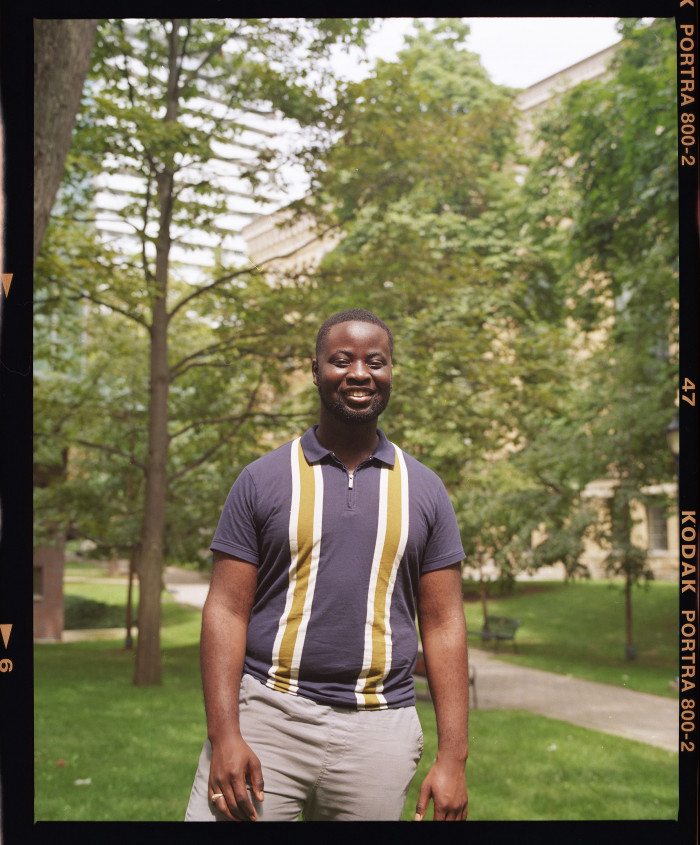Like many international students, Dhanya Dass finds it easy to talk about how she has benefited from studying at the University of Toronto. “U of T has given me so much,” says the third-year student at U of T Mississauga – “new opportunities, new friends and a new creative outlet.”
In turn, the university community has also benefited from Dass’s presence – and from the presence of more than 20,000 other students from around the world who live, work and study across the three campuses. But what are these benefits, exactly?
It’s a question to which Joseph Wong, U of T’s vice president, international, has given a lot of thought. For one, he says, Canadian students learn side-by-side with peers who often have direct knowledge of a topic. “It’s one thing to read about nationalist movements in Europe or South Asia,” he notes. “It’s an entirely different learning experience when you can talk to – and learn from – your peers who are from these regions.”
This advantage extends beyond the classroom into co-curricular experiences and conversations in residence, he says, adding up to an immeasurable impact on life at the university. “All U of T students gain a tremendous opportunity not only to be prepared academically for the world of work but also to be prepared socially and culturally for the literal ‘world of work,’” he says.
To continue to attract top global students, the university, in recent years, has significantly expanded the number – and value – of international scholarships. It has also created a $3-million International Student Experience Fund. “It’s not just a commitment to getting international students through our door,” says Wong. “It’s to ensure that they are in a position to succeed while they’re here.”
THE CONNECTOR
Ernest Nyarko
Hometown: Accra, Ghana
Five years ago, Ernest Nyarko and his friend Efosa Obano (both BBA 2018 UTSC) teamed up with other U of T undergrads to create the African Impact Initiative, a non-profit organization open to all students. Their objective: to help solve some of the problems faced by communities in Africa.
Since then, the initiative’s volunteers have been collaborating with young people from Africa to contribute to the continent’s development through community work, mentorship and entrepreneurship. One of the group’s first activities was to fund a small project to improve health-care outcomes in the village of Ikot Eko Ebon in southeastern Nigeria.
In co-founding the initiative, Nyarko demonstrated that international students do much more than just study at U of T – their global experiences help their Canadian peers understand the world better. “Diversity gives us the tools to challenge preconceptions and imagine the principles that will shape a better future,” says Nyarko, who came from Ghana to study in the co-op marketing and management program at U of T Scarborough, and now works as a management consultant at Deloitte in Toronto.
As part of his classes and extra-curricular activities, Nyarko was able to describe some of Ghana’s “non-Western realities” to his fellow students. “I made a point of sharing my experiences growing up,” he says – with the hope of giving his classmates information to question stereotypes about Africa. It’s just one example of how, by hosting students from around the world, U of T helps all of its students become better global citizens, he says.
THE MENTAL HEALTH ADVOCATE

Suddene Stone
Hometown: Central Village, Jamaica
It wasn’t until public health regulations required an end to in-person classes partway through Suddene Stone’s first year at U of T Scarborough that he truly understood how globally diverse his new classmates were. “When the pandemic hit, and people went home, I suddenly had friends in many different time zones,” he says.
For Stone, who is in the third year of a psychology degree, moving to multicultural Toronto from his native Jamaica expanded his worldview in ways he didn’t expect. It hasn’t been just about trying new foods. He has been able to observe – and compare – social, cultural and religious customs from Turkey, India and Egypt, to name just a few countries his classmates are from. “You learn how to interact with different people across different cultures,” he says.
Community work is important to Stone, who attends U of T on a Pearson Scholarship (awarded to international students who demonstrate exceptional academic achievement, creativity and leadership qualities). In Jamaica, he often spent weekends in a student-led service club, helping to plant trees, for example, or paint schools. In his first semester at U of T Scarborough, he joined the Imani Academic Mentorship Program to volunteer as a tutor for local Black youth, to encourage them to consider higher education. Although eager to help, he didn’t understand at first why such a program was needed in Canada.
He soon heard firsthand from his mentees about racism in the Canadian education system, including high expulsion rates and discrimination from teachers. “Even in middle school, they understand that much more work needs to be done in Canadian society to achieve racial equity, especially for students.”
With respect to his own studies, Stone plans to complete a master’s and PhD in clinical psychology, and aims to gain practical experience in the field while in Canada. “People who are seriously mentally ill often go undiagnosed or don’t have access to proper care,” he says. “I want to help change that.”
This story originally appeared in U of T Magazine
